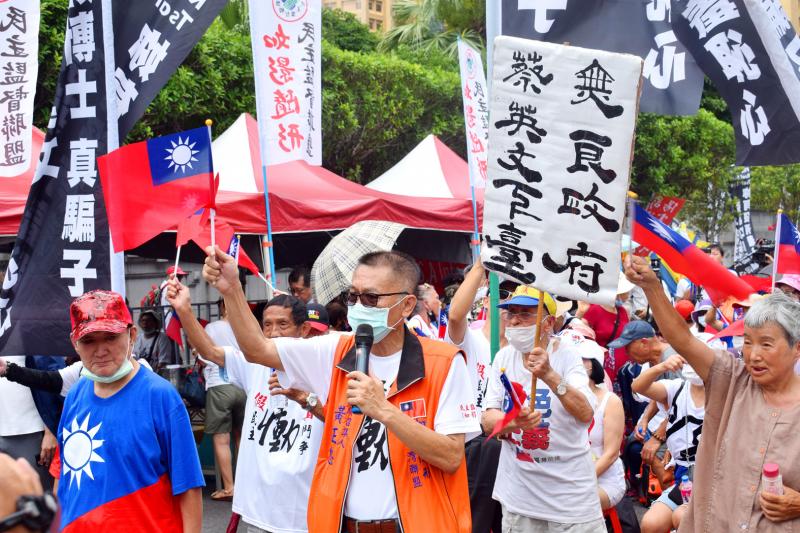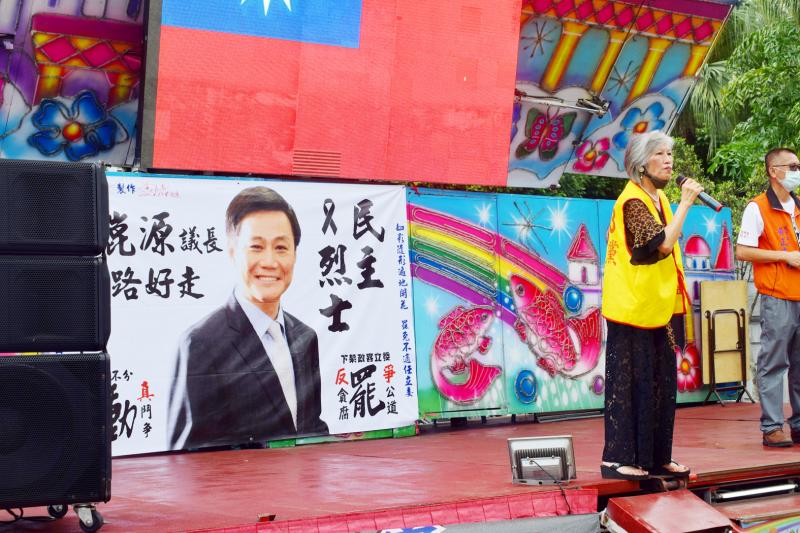Despite former Kaohsiung Mayor Han Kuo-yu (韓國瑜) of the Chinese Nationalist Party (KMT) encouraging his supporters to skip a rally held on Saturday to protest his recall, Jo Lee (李), 67, still flew to Taipei from Kinmen County to attend the event held in front of the Presidential Office.
As the rally began, Lee, a self-declared “Han-fan,” jostled to the front of the growing crowd. In one hand, she held a large umbrella, from which hung t-shirts displaying calls for “justice,” and in the other, a Republic of China flag.
“I wanted to listen to what Han said but…,” Lee said, pausing for several seconds. “We are really in pain.”

Photo: James Chater
Lee said that she was unable to sleep on June 6, the night that Han was successfully recalled; learning of the death of Kaohsiung City Council speaker Hsu Kun-yuan (許崑源), who was one of the mayor’s strongest supporters, only compounded her distress.
Like Lee, few of the estimated 500 people that attended Saturday’s rally were actually from Kaohsiung, and their frustrations were not solely directed at Han’s recall, a testament to the extent the event had diverged from its original purpose. Instead, they were using the protest to express their concerns over the state of Taiwanese politics.
The primary target was President Tsai Ing-wen (蔡英文) and her Democratic Progressive Party (DPP) administration. Those at the rally, mostly in their fifties and sixties, accused Tsai of electoral fraud and faking her PhD diploma, grounds attendees believed for the President to also be recalled.

Photo: James Chater
In this regard, much that was voiced simply re-hashed tropes critical of the DPP from the presidential campaign that ended on Jan. 11 with Tsai’s victory over Han. However, attendees, most of whom are in favor of unification, predictably expressed an acute dissatisfaction with the direction of the nation’s politics.
Sensitive to being too closely associated with China, and having run a recall campaign that criticized the vote as an unnecessary extension of the presidential election, Han’s reluctance to attend was unsurprising.
‘GONE OFF COURSE’
Lin Kuei-Hsiang (林桂香), 65, originally from Tainan, had just returned home from Hawaii for the Lunar New Year, when the coronavirus struck. Unable to leave since then, Lin said she slowly realized that Taiwan had “gone off course,” citing Han’s recall as evidence.
“Tsai can’t just use the power of the state to bring someone down if they don’t like them,” she said.
Lin said the recall was evidence that Taiwan’s democracy had been “distorted” — though the right to recall is enshrined in the constitution and it was launched not by Tsai, but by leaders of the WeCare Kaohsiung organization.
A sense of Taiwan’s “loss” or “deviation” permeated discussions with attendees. However, it most often arose when conversations touched on unification.
UNIFICATION
In this regard, the arrival of Chang An-le (張安樂), Chairman of the China Unification Promotion Party (中華統一促進黨) and a steadfast supporter of unification, provided a revealing litmus test.
Chang is a highly controversial figure. He has extensive historical connections with underground criminal organizations. After a warrant was issued for his arrest in 1996, he fled to China, but was arrested on his return in 2013, only to be released on bail.
Bobby Luo, 43, was chatting enthusiastically amongst friends when he noticed Chang’s entourage moving toward the platform. Unsure who it was at first, Luo walked across to check that it was indeed him. Returning to the group, Luo had a sudden expression of unease.
“He’s going to influence people’s perception of this event,” he said nervously.
However, Taipei resident Chung Chin (鐘琴) 66, described the appearance of Chang as “healthy” for Taiwanese society, which she says has become too sensitive to positions supportive of unification.
“There needs to be a public debate,” Chung said.
Chung criticized the education system, which she said downplays the nation’s historical links to China. With Han’s recall, she is also concerned about the growing taboo around positions supportive of unification.
And despite the conviction of the protesters, it was hard not to equate the sense of “loss” frequently mentioned with the loss of these ideas from the political mainstream.
Han’s refusal to attend, along with other heavyweight members of the KMT, pointed to the increasingly fringe position of views held by those at the rally. Young people were almost entirely absent, a stark contrast to the rally in support of Hong Kong, which was occurring simultaneously at Liberty Square a few hundred meters away.
Although the rally was small in scale, Lee from Kinmen remained optimistic that it would exert at least some kind of influence.
“The people here are like a small stone, when it is dropped into water, it creates a ripple,” she said.

April 14 to April 20 In March 1947, Sising Katadrepan urged the government to drop the “high mountain people” (高山族) designation for Indigenous Taiwanese and refer to them as “Taiwan people” (台灣族). He considered the term derogatory, arguing that it made them sound like animals. The Taiwan Provincial Government agreed to stop using the term, stating that Indigenous Taiwanese suffered all sorts of discrimination and oppression under the Japanese and were forced to live in the mountains as outsiders to society. Now, under the new regime, they would be seen as equals, thus they should be henceforth

Last week, the the National Immigration Agency (NIA) told the legislature that more than 10,000 naturalized Taiwanese citizens from the People’s Republic of China (PRC) risked having their citizenship revoked if they failed to provide proof that they had renounced their Chinese household registration within the next three months. Renunciation is required under the Act Governing Relations Between the People of the Taiwan Area and the Mainland Area (臺灣地區與大陸地區人民關係條例), as amended in 2004, though it was only a legal requirement after 2000. Prior to that, it had been only an administrative requirement since the Nationality Act (國籍法) was established in

With over 80 works on display, this is Louise Bourgeois’ first solo show in Taiwan. Visitors are invited to traverse her world of love and hate, vengeance and acceptance, trauma and reconciliation. Dominating the entrance, the nine-foot-tall Crouching Spider (2003) greets visitors. The creature looms behind the glass facade, symbolic protector and gatekeeper to the intimate journey ahead. Bourgeois, best known for her giant spider sculptures, is one of the most influential artist of the twentieth century. Blending vulnerability and defiance through themes of sexuality, trauma and identity, her work reshaped the landscape of contemporary art with fearless honesty. “People are influenced by

The remains of this Japanese-era trail designed to protect the camphor industry make for a scenic day-hike, a fascinating overnight hike or a challenging multi-day adventure Maolin District (茂林) in Kaohsiung is well known for beautiful roadside scenery, waterfalls, the annual butterfly migration and indigenous culture. A lesser known but worthwhile destination here lies along the very top of the valley: the Liugui Security Path (六龜警備道). This relic of the Japanese era once isolated the Maolin valley from the outside world but now serves to draw tourists in. The path originally ran for about 50km, but not all of this trail is still easily walkable. The nicest section for a simple day hike is the heavily trafficked southern section above Maolin and Wanshan (萬山) villages. Remains of